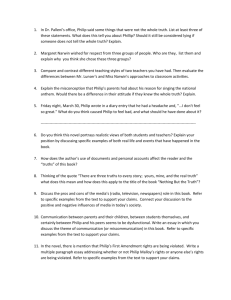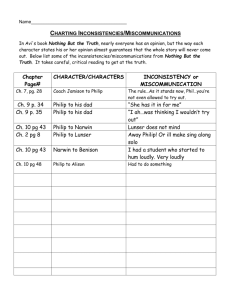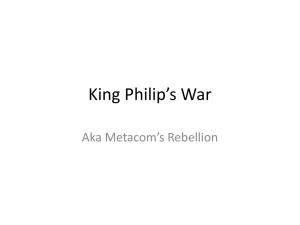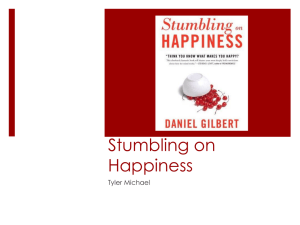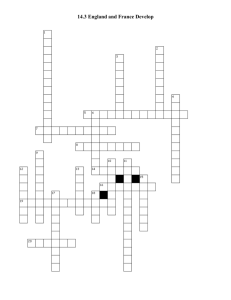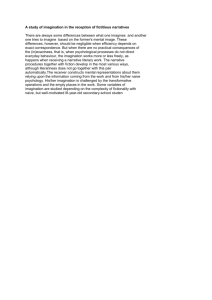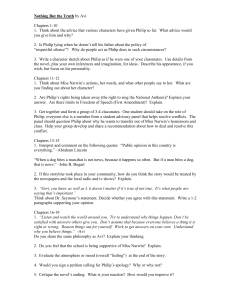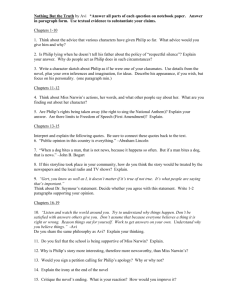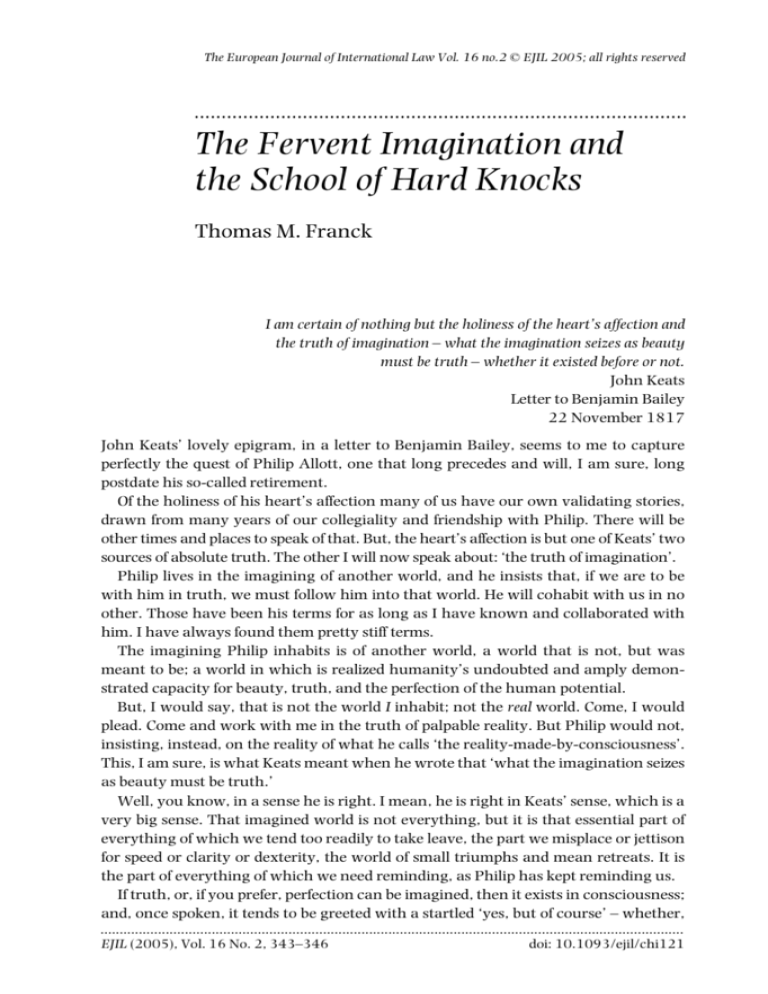
The European Journal of International Law Vol. 16 no.2 © EJIL 2005; all rights reserved
...........................................................................................
The Fervent Imagination and
the School of Hard Knocks
Thomas M. Franck
I am certain of nothing but the holiness of the heart’s affection and
the truth of imagination – what the imagination seizes as beauty
must be truth – whether it existed before or not.
John Keats
Letter to Benjamin Bailey
22 November 1817
John Keats’ lovely epigram, in a letter to Benjamin Bailey, seems to me to capture
perfectly the quest of Philip Allott, one that long precedes and will, I am sure, long
postdate his so-called retirement.
Of the holiness of his heart’s affection many of us have our own validating stories,
drawn from many years of our collegiality and friendship with Philip. There will be
other times and places to speak of that. But, the heart’s affection is but one of Keats’ two
sources of absolute truth. The other I will now speak about: ‘the truth of imagination’.
Philip lives in the imagining of another world, and he insists that, if we are to be
with him in truth, we must follow him into that world. He will cohabit with us in no
other. Those have been his terms for as long as I have known and collaborated with
him. I have always found them pretty stiff terms.
The imagining Philip inhabits is of another world, a world that is not, but was
meant to be; a world in which is realized humanity’s undoubted and amply demonstrated capacity for beauty, truth, and the perfection of the human potential.
But, I would say, that is not the world I inhabit; not the real world. Come, I would
plead. Come and work with me in the truth of palpable reality. But Philip would not,
insisting, instead, on the reality of what he calls ‘the reality-made-by-consciousness’.
This, I am sure, is what Keats meant when he wrote that ‘what the imagination seizes
as beauty must be truth.’
Well, you know, in a sense he is right. I mean, he is right in Keats’ sense, which is a
very big sense. That imagined world is not everything, but it is that essential part of
everything of which we tend too readily to take leave, the part we misplace or jettison
for speed or clarity or dexterity, the world of small triumphs and mean retreats. It is
the part of everything of which we need reminding, as Philip has kept reminding us.
If truth, or, if you prefer, perfection can be imagined, then it exists in consciousness;
and, once spoken, it tends to be greeted with a startled ‘yes, but of course’ – whether,
........................................................................................................................................................
EJIL (2005), Vol. 16 No. 2, 343–346
doi: 10.1093/ejil/chi121
344
EJIL 16 (2005), 343–346
in Keats’ phrase, it ever ‘existed before or not’. The act of imagining it, with a mind
bleary and blurred with all the real world’s impediments, is a kind of willed act of
creation which, like all creation, cannot ever have happened, even if it need never have
happened and will never happen again.
So, Philip says, a truth may come into being in the act of imagining it. No one who
has been a part of that procreation, and even those who have not, can be unchanged
by an act of imagining perfectability and thereby challenging imperfection’s truth,
necessity or perpetuity. The idea that startles social consciousness also thereby summons an aspiration to perfection into contingent existence, ‘whether it existed before
or not’.
And imperfect our international system, our world of nations, of international crises
and conferences, surely is. Philip has disdained tinkering with that surly reality: adding
a secretariat here, lifting a quota there, electing another tribunal to interpret a vague
set of rules to achieve who-knows-what.
In Eunomia, imagining ‘a new order for a new world’, Philip calls us, and challenges his students, to reinvent the fundamental underpinnings of – if not human
perfection, then, at least – humanity’s perfectibility. Dressed in clamorous white, the
book jostles, among row upon row of dull brownish-green jackets clothing erudite
tomes about arms control and countervailing duties, to establish its own contingent
existence in a self-realized space, a place on the shelf and in the mind that had not
previously been there, or had not been noticed. It demands that, with Philip, we see
‘human consciousness as containing, at last, the possibility of its own self-redeeming
through self-surpassing’.
Quite a feat for one book, or, even, one life! Philip proclaims the coming of ‘a pure
theory of social idealism which humanity has the opportunity to adopt . . . as it reconceives human existence. It is a theory which necessity now demands as a practical
theory of social idealism on which humanity must base its willing and acting if it is to
survive and to prosper in its self-creating future. And the theory of social idealism,
pure and practical, must become the basis for a new international law which humanity
will construct as the law of a new international society’ (italics omitted).
Well, yes. But, meanwhile, should there be a set of rules for humanitarian intervention,
or debt forgiveness, or tropical tariff preferences, or for the development of outer
space? And, if so, what should those rules say? And who should apply them? And
should there be penalties for non-compliance and what should they be? And how
shall we reform the Security Council, or the World Bank, or the International Committee of the Red Cross?
Here is where the fervent imagination meets the school of hard knocks.
Shall we send Chris Colombo to discover the new route to the Indies, my dear Isabella, or shall
we first try to resolve the problem we seem to be having with Torquemada and the Holy
Father?
The answer, I venture to think, is ‘neither’ and, also, ‘both’.
The pilot in Coleridge’s Ancient Mariner wisely observes that ‘the Devil knows how
to row’. So do the angels, although it is probably not their favourite form of locomotion.
The Fervent Imagination and the School of Hard Knocks
345
Have you noticed that among petty rhetoriticians there is an approximately even split
of usage between those who think that God, or the Devil, is in the details? There is
nothing inherently good or bad, desirable or reprehensible, about a career of negotiating visa waiver agreements between inconsequential nations. If a judgment on the
negotiator’s merit is to be passed, it would have to depend. Depend on what? On the
effectiveness of the way the agreement’s details work out in practice? As measured by
what? By the purpose the agreement seeks to advance? But, does it fulfil a good
purpose? Well, that would depend upon the overall design of which the agreement
imagines itself a part. To judge the part, it is necessary to know the design of the
whole.
Of course, it is not necessary that every bit player, every set-carpenter, know the
whole play; but, surely, somebody must. Someone must be the author, the producer,
the director, the hero.
There is nothing inherently better about being possessed of ‘the truth of imagination’ or, on the other hand, being a practitioner of the school of hard knocks. One is
great and good, or small and mean, according to the degree of skill with which one
practises play-writing or the sewing of costumes. There are bad plays and illconstructed sets and costumes. And, fortunately, there are excellent practitioners of
each craft.
But while there is probably no inherent preference in heaven as between
Beethoven and a really good plumber, there probably is a free-market value that
affects what heaven thinks each is worth. That market value is an operational product
of the economy of scarcity. One Beethoven, a thousand plumbers. It can’t help but
affect the comparative value of each.
Well, what is the market value – denominated in merits – of lawyers well versed in
‘the truth of imagination’ – I mean the ones who think about what ends of human
perfectibility might, ultimately, be served by freedom of movement among persons
free to move about, a freedom which, in turn, might be advanced by a visa waiver
agreement? What is the merit-value of an excellent practitioner able to imagine the
ideal truth which, eventually, becomes true because it has been imagined, whether it
existed before or not? That lawyer’s social value, surely, is determined by the ratio of
people engaged proficiently in that particular form of creative activity as a ratio to
those – diplomats working out the legal text of the visa-waiver, for example – who are
busy with other forms of proficient craftsmanship, at any specific moment in the evolution of human progress.
What, then, should Isabella have replied to Ferdinand? Surely this: ‘It all depends.
How many great navigators are at our disposal just now who could discover the new
world? And how many proficient theologian-diplomats do we have who could
persuade the Holy Father to send Torquemada to start a monastery in Sweden instead
of hunting Jews like Chris Colombo?’ There is no contest in absolute merit between
imagining the ideal and getting that little incremental thing done.
But, for better or worse, there is a competition in comparative merit-value, one
created by the comparative scarcity of skills in a market-driven economy of personal
worth. Happily, we live in an age of abundance when it comes to skilled lawyers
346
EJIL 16 (2005), 343–346
trained in the many schools of hard knocks through which pass the hard-nosed realists
that grace our great law firms, our foreign offices and our tribunals. But, practitioners
of law-as-the-art-of-creatively-imagining-our-perfectable-future: well, they are not
exactly listed in the Yellow Pages!
That scarcity of the perfectionist’s imagination cannot but drive up the price, perhaps
even far beyond its inherent worth: if there were such a thing as anyone’s inherent
worth and it could be determined, which, of course, it cannot be.
So I cannot state with certainty that Philip Allott, the consummate practitioner-oflaw-as-the-art-of-creatively-imagining-our-perfectable-future – oh, how he loves those
invented, endlessly-hyphenated Germanic compound nouns – nor can I truly aver
that he is the best international lawyer, that what he does is of greater value than
what the rest of us do. I can say, however, with no fear of contradiction, that the
vision at which he excels is so rare in our profession, in ministries, our chambers and
our academies, that it makes him a counsel beyond price. May he be our teacher and
counsel long enough, may he inspire enough of his students, as to begin to reverse the
market economics that so outrageously inflate Philip’s sky-high merit-value.

